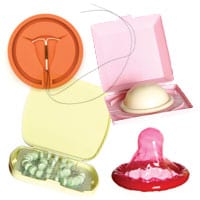Although it might seem fair for it to be otherwise, the reality is that right after the birth of your baby you have no natural or special protection against conceiving another child.
During this time, it’s important for you to take in all of the factors affecting your birth control choices, including your recovery from birth, whether you had an incision, episiotomy or tear that needs healing, your energy level, infant care needs, and emotional readiness, before resuming sexual activity post-pregnancy.
This is a time for you and your partner to practice open and caring communication, especially as you adjust to life-changing roles with a baby in the house, as these stressors can affect your sexual relationship and intimacy. First, have a plan to make sure that you don’t resume sexual activity before you have taken appropriate precautions. Discuss how any of the following options might work best for you and your partner with your healthcare provider to make the best choice for your body and its health.
Oral contraceptives
Because pregnancy increases your risks for blood clots, and your body is recovering for several weeks post-birth, you can’t start on oral contraceptives immediately following your baby’s birth. Combination hormone pills can affect milk supply, so wait until your milk supply is well-established before resuming oral contraceptives. There are a lot of options to choose from so this requires a risks and benefits discussion with your healthcare provider to find which one would work best for you.
Diaphragm
Your body has changed through pregnancy so don’t be surprised to find that if you want to continue using a diaphragm, you’ll need to be remeasured for a proper and reliable fit. Pregnancy changes the shape of your cervix and vagina. You can do this at or after your six-week check-up.
Condoms
Condoms are often your best bet post-birth. And using water-based lubrication products may be helpful, particularly if you’re experiencing vaginal dryness after birth or while breastfeeding.
IUD
If you were an IUD fan before birth, you’ll have to wait until your body is entirely healed from delivery, typically 6 to 12 weeks, before this device can again be inserted into your uterus.
Breastfeeding
While breastfeeding does provide some postpartum protection, it’s only as reliable as you and your hormones are. You may ovulate before you menstruate so breastfeeding is not recommended as a birth control method. You can discuss the lactation amenorrhea method (LAM) if you are exclusively and frequently breastfeeding, and ask about adding a hormonal contraceptive to your regimen just to be safe.
Tubal ligation
If you’ve completed your family, you may want to consider tubal ligation, which is a surgical, sterilization procedure, often done during a c-section or while still in the hospital after delivery. It’s not without risks, and it should be considered a permanent decision that’s made only when you’re certain you don’t want more children. It shouldn’t be taken lightly in the context of relationship issues, economic circumstances, or input from others. If you’re on Medicaid, federal law requires that your consent papers be signed well in advance of your delivery, so discuss this in a timely manner with your care provider.







Comments are closed.